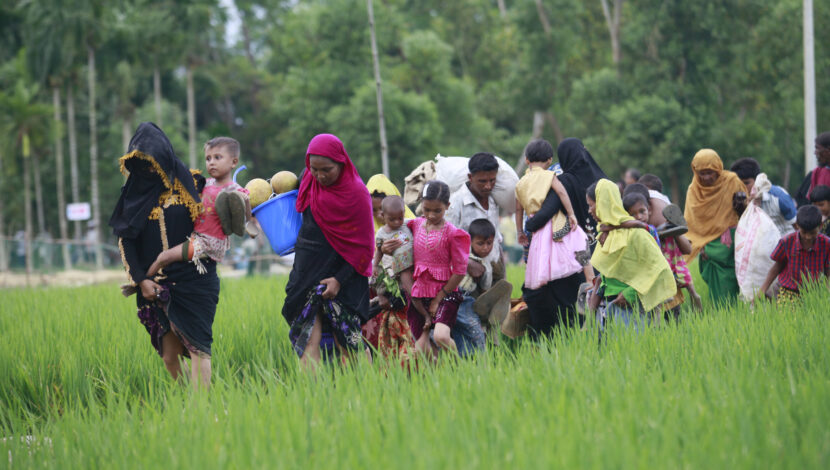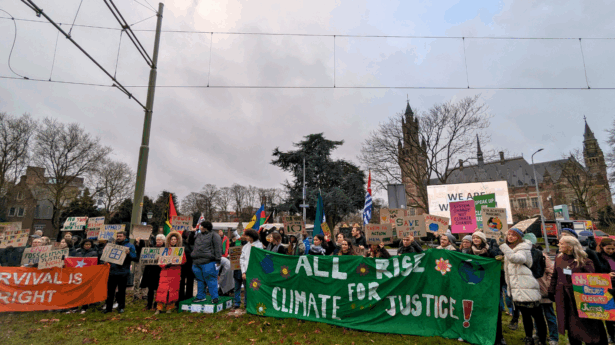The Unitarian Universalist Service Committee advances human rights through grassroots collaborations.
Holding History Accountable for the Present: The Rohingya

By UUSC Staff on August 25, 2023
Between the Bay of Bengal and Naypyidaw (the modern capital of Burma) lies a stretch of coastal land that one of the most persecuted ethnic groups in the world have called “home” since the 15th Century.
Most of the Rohingya people who once lived there in the Rakhine State, western Burma, now live as refugees across the border in Bangladesh where they face food and water shortages, among many other basic needs. They were driven there by the systemic discriminatory policies and genocidal oppression of the Burmese military junta.
In a deal brokered by Chinese officials, the Bangladeshi government has begun working with the junta to repatriate a little more than 1,000 Rohingya back to the Rakhine State. It’s not clear what waits for them back home.
The Rohingya—a muslim minority group that lived amid the predominantly Buddist Burmese—are at the center of one of the world’s largest and fastest human migrations in recent times. August 25 marked six years since the start of clearance operations to remove them from Burma. Since 2017, over 700,000 Rohingya have fled to places like Bangladesh and other large cities in the area. Half of that number are children.
Sadly, unstable conditions and the risks of migration have claimed many Rohingya lives during this time. Since 2017, over 24,000 people have been killed as the result of the clearance operations, but the actual number could be higher. This is in addition to myriad accounts of sexual assault, arson, and other heinous acts against the Rohingya people.
Seeds of genocide
Burma was renamed “Myanmar” two decades after the military junta seized power in 1962. The country claims and sometimes celebrates the diversity of its 135 official ethnic groups, which is an unrealistic number used to divide diverse ethnic groups to smaller sub-groups, a list that excludes the Muslim Rohingya. The junta and the law don’t consider the Rohingya to be citizens of Burma. For decades, they’ve been classified as illegal Bengali immigrants, even if they were born in Burma.
Rohingya and their allies have worked to be recognized as citizens of Burma since Burma’s independence in the 1940s, but with only small signs of success that have been quickly erased by Buddhist nationalists or the junta. For a short period of time in the 2000s, Rohingya were granted temporary status (“white cards”). One of the few benefits of white card status was that for the first time in the country’s history, Rohingya were eligible to vote. However, this temporary status was revoked in 2015.
Now, the Rohingya who remain in Burma are required to carry a national verification card. This legal document essentially reinforces their “otherness” and status as non-citizens.
This lack of recognition and citizenship institutionalized discrimination against the ethnic Rohingya/Muslim minority. The junta imposes restrictions on Rohingya marriage, employment, education, and physical movements, among many other basic rights.
These are the practices and structures that sow the seeds of genocide.
When the Rohingya became refugees
Prior to August 2017, a third of the population in the Rakhine State—slightly more than 1 million people—were Rohingya. Now, only several thousand Rohingya remain.
Smaller armed conflicts between rebel groups and Burma Army forces in the region initiated the early forced migration of Rohingya as early as the 1990s, but the mass migration away from the Rakhine State came in 2017. That year, the government designated the Arakan Rohingya Salvation Army (ARSA) as a terrorist organization and waged a “clearing operations” campaign as a “counter insurgency measure,” in Rakhine State. Hundreds of Rohingya villages were destroyed, and nearly 7,000 Rohingya people died within the first few months of the campaign.
During that time, at least 700,000 Rohingya fled the violence. Even more have left the Rakhine State since then due to safety and security, the stress of severed family ties, poverty, extreme weather events like cyclones, continued legal persecution, and violence escalated by the most recent military coup in 2021.
To wage its war, the regime received funding and support from China. Russia, despite having both hands full with its invasion of Ukraine, also weapons and delivered fighter jets to the regime.
Some Rohingya have migrated from the Rakhine State to Thailand, India, and Malaysia. Most, though, have made their way north into an area of Bangladesh known in English as Cox’s Bazar.
Cox’s Bazar is a town on the southeast coast of Bangladesh, about 45 minutes to the world’s largest refugee camp. It’s there that you’ll find both the longest uninterrupted natural beach in the world, as well as the world’s largest refugee camp: Kutupalong. This camp is 5 square miles and houses up to one million people.
Living as refugees, and the latest repatriation scheme
The Kutupalong refugee camp is a government-operated camp that began informally in the 1990s as several thousand Rohingya refugees escaped from the government’s Operation Clean and Beautiful Nation, which was a military operation to expel the Rohingya from Rakhine.
Before August 2017, around 34,000 registered refugees lived in Kutupalong or in smaller neighboring camps. (Several hundred thousand undocumented Rohingya lived elsewhere throughout Bangladesh, according to the United Nations High Commissioner for Refugees). By September 2017, the number of registered refugees doubled. Now, more than 1 million Rohingya live in Kutupalong and beyond.
Life in the camp can be very difficult. Prolonged dry seasons due to human-caused climate change lead to fires that easily incinerate clusters of shelter, belongings, and lives. Diseases are easily spread due to the overcrowding of the camp and flooding in monsoon seasons can take numerous lives.
Despite their aspirations, teens are left with very few opportunities to support themselves or further their education. They’ve become much more vulnerable to gang violence, armed groups, child marriage, drug abuse, and trafficking. Access to basic healthcare services isn’t easy to come by, and due to dwindling funds, the monthly stipend for food was decreased from $12 to $8.
Many Rohingya have wanted to return home to Rakhine since the moment they left, but not if things remained the same from where they came. A couple repatriation attempts have failed, but soon the first group of Rohingya people will return to Rakhine—some, allegedly, against their will.
In a deal brokered by China—who funds the junta—the Bangladeshi government and the regime have organized a repatriation scheme, without refugees’ inputs or decision, for a little more than 1,000 Rohingya people. It is set to begin within the next few months.
Families that agree to return will receive $2,000 USD. However, they currently have no guarantee of safe passage, safety once they arrive, U.N. oversight, or access to property they may have previously owned. Further, Rohingya still are not one of the 135 ethnic groups officially recognized by the sitting regime, and they are still not considered citizens.
The only documentation they’re guaranteed to receive is their National Verification Card (NVC), which is an ID that will say that they are a Bengalese Muslim. It will not even say that they are “Rohingya” because the junta doesn’t recognize that self-identification as legitimate.
Some Rohingya have volunteered to go back despite the threats and uncertainty they face, while others have reported being coerced against their will into signing the repatriation papers.
It is a real possibility that at some point, repatriated Rohingya will end up not on the land they once inhabited but in one of the many internment camps already built in Burma alongside many of the Rohingya that still live in internally displaced person (IDP) camps in the country.
UU’s responsibilities regarding the Rohingya
In solidarity, it’s important that unrestricted funds are available to grassroots organizations with the networks, trust, and access to get aid where it is most needed. You can support this effort by donating to our partner the U.S. Campaign for Burma donation page. A donation to UUSC also helps our long-term work to achieve justice and equity for the Rohingya and other ethnic minorities in Burma.
The military junta is now inflicting violence on its own people. In February 2021, they opened fire on protesters. This past April, junta aircraft bombed a gathering outside of Paziguyi. Over 200 people were killed, including 38 children. Other airstrikes have been confirmed. As of yet, no significant move toward accountability has been taken by the United Nations.
The constant threat of airstrikes is exactly why the Burmese military must be cut off from its supply of jet fuel from the West. The United States increased its sanctions against Burma on August 23. Sanctions now include foreign companies or individuals that are aiding the junta in obtaining jet fuel. However, the focus is only on a few actors involved in Burma’s jet fuel industry. While we recognize a decisive act from the Biden administration, we also urge President Biden to use strong and tangible targeted sanctions to cut off the junta’s access to gas revenue, which has been their lifeline for decades, by sanctioning the Myanmar Oil and Gas Enterprises (MOGE) .
We need your help to make a difference in Burma. UUSC is gathering signatures to call for more accountability. Please click this link to read the faith letter we sent to Secretary Antony Blinken and share with your networks.
Image credit: iStock

